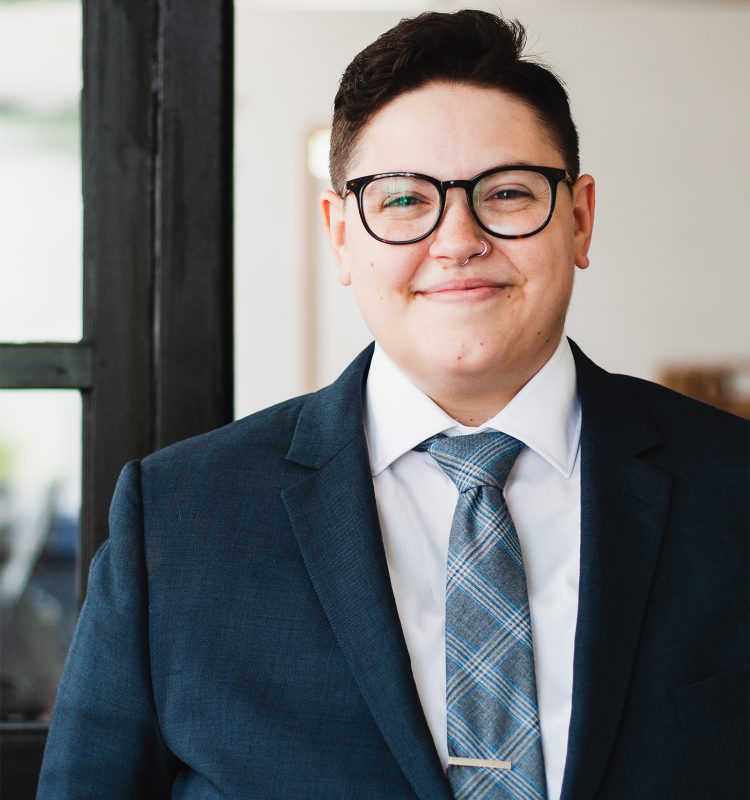
At only 29, Chelsea Gregoire—Baltimore-born, Annapolis-raised—has worked at a number of spots around town, from Dooby’s to City Café to Ida B’s Table. She also runs her own consulting company, Drinkable Genius, and hosts workshops all over the country.
Her most recent role is general manager and beverage director at True Chesapeake Oyster Co. in Hampden’s Whitehall Mill, a post that has earned her a coveted nod from Esquire magazine as Beverage Director of the Year.
When asked how to distill down the question, “Who is Chelsea Gregoire?” the former theology major talks about creating her own sacred community behind the bar. “I really care about caring,” she says. “I give a damn about giving a damn. I feel too deeply, but that’s what makes us human.”
Her spiritual life continues in hospitality work. “There’s always an element of spirituality in my life,” she says, “whether it’s a reverence for human beings and for the environment or for the basic needs of all people that flows through me.” (Let’s cheers to that.)
We caught up with Gregoire to chat about her recent award, how theology led to a career in the hospitality industry, and what to drink at True Chesapeake.
How are you feeling about being in the spotlight? I’m sure that you would have been thrilled with being named the Best Beverage Director in Maryland, but being named Beverage Director of the Year on a national scale—that’s next level.
I feel completely overwhelmed in all positive ways—I am on Cloud Nine. I’m not one who likes attention, so having all of this attention is a little weird for me. It’s exciting—it means that I get to represent Baltimore on a national stage and that’s a huge deal. I’m just taking it day by day.
What was your reaction to the news when you heard?
I woke up to this email from Esquire [last Wednesday] and I wanted to scream, cry, and pass out all at once. Instead, I went with my wife to La Cuchara to celebrate that night—and then I went to work.
You have two degrees in theology. How did you segue from your studies to working in hospitality?
I enjoyed my theology classes when I was at Jerry Falwell’s Liberty University and was one of the few women in the program. When you graduate with a master’s in theology, you either teach or you pastor at a church. I thought I would teach for a bit, but as soon as I came out as gay in 2013, the opportunities were all gone. But I’d worked in restaurants and cafes all through college, and I realized that community in a restaurant or bar is really beautiful.
I love the idea of all these people working together. There’s something really poignant and beautiful about going to a restaurant that makes you feel like you’re at home and a part of something—it nourishes you, obviously. Getting nourishment is a human need that we have but, also, it provides an unmatched opportunity for community and getting to know other people and where they come from.
Tell me about the wine and beer program at True Chesapeake.
We have a large wine program that spans a lot of regions around the world and magnifies the flavors that chef [Zack Mills] is working with. We have something for everyone with a wide swatch of pricing. All of our beers are local or just over the Pennsylvania line. And we have one beer from Virginia that’s a nod to [co-owner] Nick Schauman’s The Local Oyster in Ballston.
And what about cocktails?
I’ve done enough cocktail programs at this point that I generally walk through with a framework—keeping in mind what flavors and ideas I want to hit. But, in researching this menu, I also went on an adventure to all the places in the watershed that I grew up going to as a kid—the parks, the waterfront, being out on the water and eating random things from nature. I allowed those smells and experiences to dictate where the menu went.
True Chesapeake is about home for me and Zack and Nick and [co-owner] Patrick [Hudson]—this is home for us. I always felt so lucky to grow up so close to the water, particularly the Chesapeake Bay and all of its estuaries and the watershed in general. I felt that it was so important that my experiences of growing up in this area, and how much they echoed these bodies of water and the sights and sounds and nature surrounding them, was seen through the cocktail menu.
Your cocktails are clever in every way, from the ingredients to the names. How do you name them?
“Holy Lagoon” is the tiki-inspired drink that we have on the menu right now. Little known fact: St. Jerome Creek, where are oysters are grown, is actually a lagoon. It’s named after a saint. I was like, “‘Holy Lagoon’ would be a perfect name for a drink.” It’s as if it was actually a tiki drink before it was a tiki drink.
Any other inspiration?
“Prettyboy” is named after the reservoir…and there are tiny hints to this area throughout. Take “Old Foraged” [Old Forester bourbon bitters, spicebush turbinado, citrus peel]—that name doesn’t necessarily harken back to anything except we use spicebush to infuse our turbinado syrup that grows all over the area. You can go out to the woods and probably find it right now. “By Word Nor Deed” [sotol, amontillado sherry, lemon oleo, applejack, bitters] is boozy, but balanced because it has amontillado sherry. “By Word Nor Deed” is both a reference to the Maryland state motto, but also a direct quote from Edgar Allan Poe’s, “The Cask of Amontillado.”
What should a first-timer order?
I would tell them to go for the cocktails they are familiar with. Get an “Old Foraged” because you can mentally relate that to an Old Fashioned. Or get “Forester’s Union” [gin, lemon, molasses, smoke] because you can mentally relate that to a gin sour, and then once you have those notions of, ‘This is what this is like,’ in your head, that’s when you get to see what message the bartender is sending. It creates an experience that shows what the concept is about. It’s a more adventurous way to drink. The things that make it different is what makes it exciting.
What’s the next big thing? Where are we going with cocktails?
What will the Beverage Director of the Year accolade mean for you?
I’m hoping this will afford me other opportunities, but I’m never leaving Baltimore.
